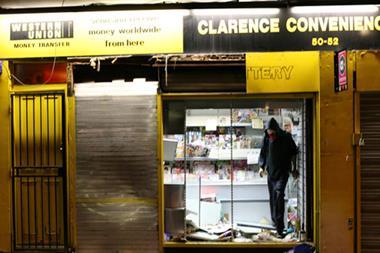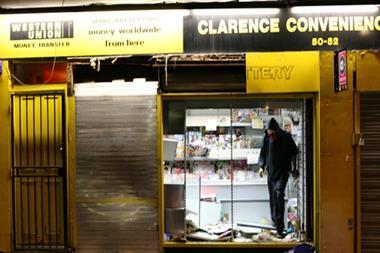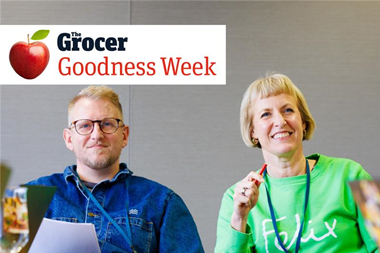As Croydon retailers take stock following last week’s violence, Elinor Zuke talks to retailers and local residents about the impact of the riots on their community
West Croydon’s London Road is a world away from the chain stores on the more affluent east side of town.
There, police were quick to protect the commercial town centre last Monday night. Windows were smashed and three stores looted, but the situation was quickly contained and most were spared the violent excesses elsewhere.
Instead, it was independents along the once-busy London Road that were at the epicentre of last week’s local riots. Nearby, Reeves the furniture store was burnt to the ground. It wasn’t the only shop to suffer. Reports described 200 people running up and down the road a crucial artery into the town from Streatham and Brixton smashing their way through buildings, loading vans with heavy electrical items and setting fire to shops that people lived above.
A week later, several shops remain boarded up, and one of the fires has closed off the road, stopping buses from getting through. The affected building housed several people and shops, including Best Food, a once bustling grocery store specialising in Sri Lankan, Caribbean and Polish products. All that remains are the late eighteenth century building’s solemn arches and a heap of bricks.
One resident stares in disbelief. “They were just family businesses trying to make a living,” she reflects on the burnt-out shells. She says she likes to stay optimistic, and that she will continue to walk the streets where she lives but her 17-year-old daughter is afraid of repeats. “She was distraught that it was kids her age. She asks me, ‘What if it starts again?’”
Lidl, one of the biggest shops on the road, and the only grocery multiple, remains closed. A pensioner wheels up a big shopping bag and asks whether it’s reopened yet. But that seems a long way off. Roof tiles and broken glass are still strewn across the path to the entrance, as young boys on bikes ride past, ghoulishly, and take a closer look.
Inside, the store has been totally gutted. Although the basic structure remains, the ceiling is exposed and it still smells charred. A banner under missing roof tiles understatedly promises that the derelict site is undergoing improvement works.
Some retailers have bounced back. CTN Early Till Late was broken into at 7.50pm last Monday. A group of 40-50 stole all the cigarettes and alcohol and smashed up everything else. The looters prised up the metal shutters just enough to smash their way through.
It cost £10,000 to repair and re-stock the shop, which reopened on Wednesday. But since then trade has been very subdued. “Before, we turned over £11,000 every day now it’s more like £3,000. It’s too quiet,” says Dhaval Patel. “There were no signs of recovery over the weekend and customers came to warn us that it might happen again. I don’t believe those rumours anymore, but I still close the shop at 8pm or 9pm instead of staying open until 10pm.”
With no traffic, many shops still boarded up and parts of the street resembling a war zone, even the ‘lucky ones’ whose shops went untouched are feeling the full effects. On the other side of the safety cordon from Best Foods is Sadhik Babu’s small grocery store, Haran Bros. Babu says, succinctly: “There’s been no business all week, no people, no nothing.”
At Beydagi food centre they rushed to close the shutters and watched from inside as the mob descended.
“There were lots of Turkish people outside and fortunately nothing happened to our shop,” says Ali Kandil. “It was the community, not the police, that stopped them.”
Nevertheless, trade has fallen by 25% since then. With bars and restaurants deciding it is safer to close at 10pm, there are fewer people who come to buy cigarettes and alcohol. In turn, Beydagi has been closing at 1am, two hours earlier than usual.
A worker at family grocer Kandil which was left standing between a boarded-up and ransacked musical instrument store and the burnt skeleton of a pawnbroker shop says the business has been taking 50p for every £1 of sales it would have expected. Water gushed into the side of the shop when the pawnbroker was set alight, causing £15,000 of flood damage.
“We’ve got insurance but we don’t know if everything will be covered,” says Sajad Azizz. “We’ll try to carry on but we can’t afford to without it. Everybody’s scared. All our customers are calling, asking what happened to the shop and saying they don’t want to come out.”
Some shoppers have returned to the area. “It’s a quarter of how busy it normally is,” says one. And some feel a sense of duty to support the local trade. A defiant Maliha Kahn says her parents used to own a shop down the road and she’s been visiting the butcher for as long as she can remember.
“I trust the owner here and always get excellent service. People should carry on about their daily business and not give into rioters. That will annoy them more than anything,” she says.
But it’s not just the volume; the pattern of the footfall has also altered. Zizy Haji has a dishearteningly straightforward explanation for why she is out shopping today. “It didn’t feel safe before, there was tension in the air. I prefer to do my shopping when it’s busy, otherwise someone could mug you.”
At Savemore Spicy Foods, manager Sajid Butt says such fears are not misplaced, and calls for a police presence at every junction. He has managed the store since 1990, but is now scared to open after 2pm. “Young people made trouble before, and we complained to the police so many times,” he says. He is also angry at the gulf between the damage to businesses on his street compared to the police-protected Whitgift Centre.
In the best-case scenario, he thinks, it will take up to six months for the footfall to return.
“Business was good before. The shop was really busy because of Ramadan, but it’s not like before. People are scared to come to this area,” he says. “They phone and ask if we can deliver to them instead. Half my business is gone. We used to turnover £30,000 in a week, but at the moment it’s not even £15,000. We have no choice but to carry on, though it’s difficult to say how we will survive it.”
Butt closed the store on Monday afternoon when he heard gangs were on their way, and did not reopen until Wednesday. Thankfully, no damage was done on the day. However, not bearing witness to events doesn’t stop people here from being deeply affected.
Born in Pakistan, last week’s scenes were not altogether unfamiliar to Butt. “Looting happened over there so many times,” he reflects. “Now I can say the same is happening in Croydon as it did in Pakistan.”
Sign in to comment on this article
Not logged in before? Register for FREE guest access today.
You will be able to:
- Read more stories
- Receive daily newsletters
- Comment on stories
Advert



















No comments yet